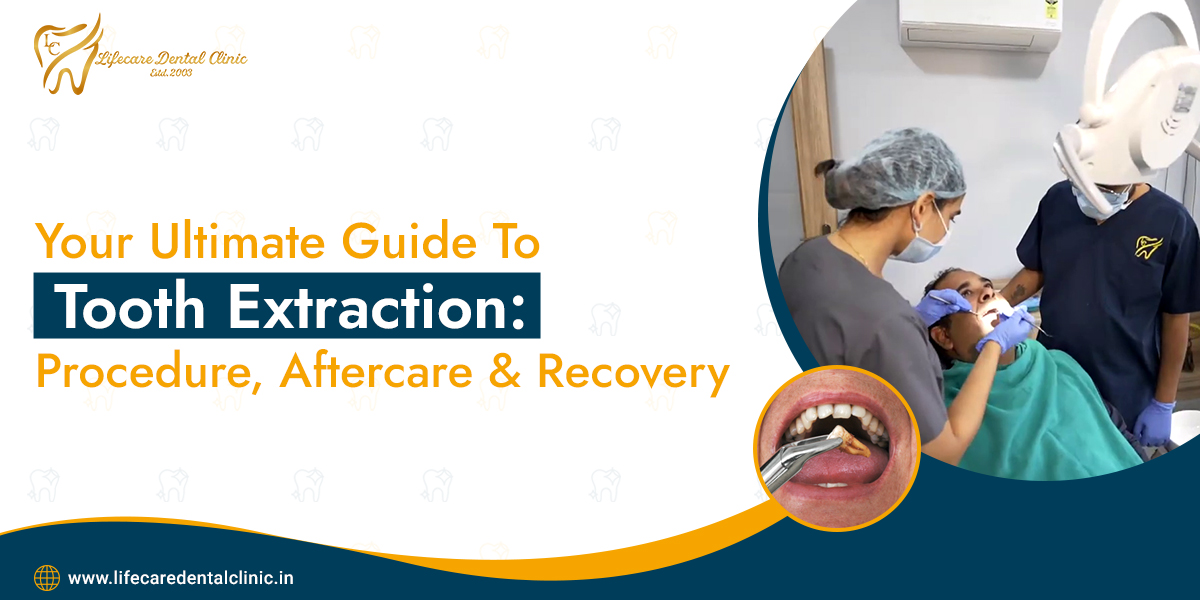Your Ultimate Guide To Tooth Extraction: Procedure, Aftercare & Recovery

Published Date: September 20, 2024 Last Update: September 26, 2024
Author: Dr. Manpreet S. Walia
Tooth extraction can be a painful thought, but maintaining oral health is often necessary. Whether you're dealing with an annoying wisdom tooth or a damaged tooth that just won't heal, understanding the tooth extraction process, what to expect during the procedure, and how to take care of yourself afterward can make the experience much smoother and the benefits long-lasting. Let us walk you through everything you need to know about tooth extraction, from the procedure itself to aftercare and recovery.
Understanding the Tooth Extraction Procedure
The tooth extraction procedure may sound intimidating, but it's a common and straightforward process that general dentists and oral surgeons perform frequently which involves removal of a tooth from its socket in the bone. While dentists always strive to preserve your natural teeth, there are situations where extraction is the best or only option. Reasons for tooth extraction may include severe decay, infection, crowding, or a tooth that is damaged beyond repair. The process can be divided into two main types: simple extraction and surgical extraction.
1. Simple Extraction
This is performed on a tooth that is visible in the mouth and is easily accessible. This is typically the case with teeth that are not severely damaged or impacted. It is conducted after administering a local anesthetic to numb the area. The dentist then uses a specific instrument to loosen the tooth. Once the tooth is sufficiently loosened, forceps are used to remove it from the socket.
2. Surgical Extraction
When a tooth is not easily accessible, either because it hasn't fully erupted or has broken off at the gum line, it might need to be removed surgically. Wisdom teeth often fall into this category. After numbing the area just like it was done in the above case, the dentist or oral surgeon may make a small incision in the gum to access the tooth.
Regardless of the type of extraction, the procedure is designed to be as painless as possible. Your dentist will ensure that you're comfortable and informed throughout the process.
Read This Article - Stages of Tooth Decay and How to Treat It
What to Expect During the Tooth Extraction Process
Knowing what to expect during the tooth extraction process can help alleviate any anxiety you might have before the procedure. Here’s a step-by-step overview:
1. Consultation and Examination
The first step in any tooth extraction is a thorough examination, often including X-rays, to assess the tooth's condition and the surrounding bone. This enables your dentist to determine the best approach for the extraction.
2. Anesthesia
A local anesthetic will be administered to numb the area around the tooth, ensuring that you won't feel pain during the procedure.
3. Tooth Removal
During the procedure, the dentist will use specialized tools to carefully remove the tooth. There might be a feeling of some pressure but not painful. The length of the procedure varies depending on the tooth's condition and location.
4. Post-Extraction Care
After the tooth is removed, the dentist will place a gauze pad over the extraction site to help stop the bleeding. You’ll be asked to bite down gently on the gauze to create pressure and allow a clot to form.
Read This Article - Orthodontic Braces Problems That You Can Fix at Home
Aftercare of a Tooth Extraction
For a quick recovery post-tooth extraction, proper aftercare is critical. This will also ensure the longevity of the dental procedure done. Here’s how you can ensure that your mouth heals properly:
1. Managing Pain and Swelling
It’s normal to experience some discomfort and swelling after the extraction. Your dentist may prescribe pain relievers or recommend over-the-counter pain medications to help manage this. Applying an ice pack to the outside of your face for 10-20 minutes at a time can also reduce swelling.
2. Keeping the Area Clean
Ensure that the extraction site is clean in order to prevent infection. However, avoid rinsing your mouth vigorously for the first 24 hours, as this can dislodge the clot that is forming in the socket. After 24 hours, you can gently rinse your mouth with a saltwater solution (1/2 teaspoon of salt in 8 ounces of warm water) to keep the area clean.
3. Dietary Adjustments
Stick to soft foods for the first few days after your tooth extraction procedure. Foods like yogurt, khichdi, and mashed potatoes are good choices. Avoid hard, crunchy, or spicy foods that could irritate the extraction site. Stay hydrated, but avoid using straws, as the sucking motion can dislodge the clot and lead to a condition known as dry socket.
4. Activity Level
Take it easy for the first 24 hours after your tooth extraction. Avoid strenuous activities, as this can increase blood flow to the extraction site and cause bleeding. Rest with your head elevated, especially during the first night.
5. Oral Hygiene
Continue brushing and flossing your other teeth, but be careful around the extraction site. Take guidance from our dentist on this. You may need to avoid brushing the extraction area for the first day or two to allow the site to heal.
Read This Article - Retainers: Your Smile's Best Friend After Braces and Clear Aligners
Conclusion
Tooth extraction can be necessary at times in everyone’s life. But it doesn’t have to be a stressful experience. Understanding the tooth extraction process, what to expect during the procedure, and how to care for yourself afterward can make a significant difference in your comfort and recovery. Remember, your dentist is there to guide you through every step, ensuring that your tooth extraction procedure goes smoothly and that you recover quickly. In case of any further concerns related to your dental health, contact Lifecare Dental Clinic at +918591297780 today and get yourself the best treatment your teeth deserve.

Leave A Reply